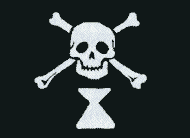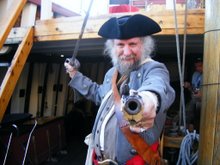Last night TCM had a tribute to Errol Flynn which included the Sea Hawk and Captain Blood. On the surface, these are similar movies. Each has an outcast sea captain fighting for England against Spain. One huge difference is that the Sea Hawk takes place in Elizabethan England and features a privateer. Captain Blood is an outright pirate although he is pardoned at the end. From the Spainish point of view, though, both were pirates. As the principals made the transition from patriotic privateer to pirate, the public didn't notice the difference.
All of this started with Columbus's voyage. As soon as he returned Spain and Portugal sent petitions to the Pope asking for a monopoly on pagan lands discovered. Since Spain was sailing west and Portugal was sailing to the east around Africa, the Pope drew a line across the world. All non-Christian lands west of this Line of Demarcation were Spanish. The rest were Portuguese (side-note - since South America bulges to the east, Brazil ended up on the Portuguese side and still speaks Portuguese).
None of this mattered until later in the 16th century when some English got the idea of trading with the Spanish colonies. They would sail to Africa, pick up a load of slaves, then sail to the Spanish colonies in America where they undercut the official Spanish prices. Since Spain had granted a trade monopoly, the colonies were officially barred from trading with the English. This lead to a little nicety where the English would fire their cannons a few times, the Spanish governor would surrender, and the peaceful trading would begin. For a few years this worked out nicely for everyone involved (except the African slaves). Then the Spanish plate fleet happened to arrive at a port the English were trading from. The English opened negotiations, saying that they were peaceful traders. The Spanish agreed to let them pass the next day then attacked the English at night. Most of the English were captured and turned over to the Inquisition. One of the few English who escaped was Francis Drake. He vowed to never deal peacefully with the Spanish again.
When Drake returned to the Caribbean, he was no longer trying to trade in peace. Instead he raided towns and captured treasure ships. Since relations between the two countries were already strained and this brought Elizabeth a huge profit, she knighted Drake. The attempted invasion of England by the Spanish Armada and the Duke of Parma's troops left a lasting impression on the English. Spain was the enemy, regarded much like Nazi Germany is today by the US. Anyone who attacked Spain must be an English patriot, regardless of current relations between the countries.
Spain didn't help matters much. They continued to insist that the Line of Demarcation gave them a monopoly on America. English colonists who fell into Spanish hands were treated harshly. The battle cry on both sides was "No peace beyond the line".
When Morgan raided Spanish cities in the 1680s he was going way beyond the terms of his charter but all was forgiven, both because he was successful and because the English still considered Spanish colonies fair game.
With the exception of Treasure Island, pirate movies prior to the 1990s followed this formula. It didn't matter if the hero was a privateer or a pirate, he was justified because he attacked Spain. It's the ambiguity that lets us cheer for pirates. As long as they attack the greater evil, they can be heroic.
Somewhere in the last decade or two, Spain lost its luster as an all-purpose villain. Now pirates fight each other (Cutthroat Island, PoTC I), the supernatural (PoTC I, II & III) or overbearing English authority (Cutthroat Island, PoTC III).
Subscribe to:
Post Comments (Atom)


No comments:
Post a Comment